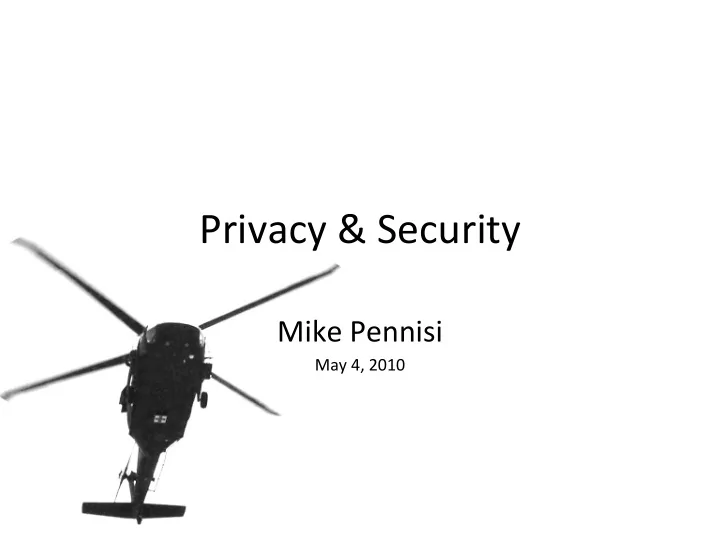

Privacy & Security Mike Pennisi May 4, 2010
Why does this keep coming up?
“Shifts in technology require us to rethink our attitude towards privacy, as suddenly our abilities to see, hear, detect, record, find, and manipulate others and their lives is greatly enhanced.” - Langheinrich, 2009 “Privacy in Ubiquitous Computing”
We don’t have a poster!
Privacy != Security
“Ensuring the confidentiality and authenticity of a particular information does not say anything about how and when this particular piece of information will be used by its designated recipient.” - Langheinrich, 2009 “Privacy in Ubiquitous Computing”
Security Framework for information control Privacy State achieved when the framework suits the needs of its users
Privacy as a balancing act Being “let alone” vs. Participation in society [Langheinrich, 2009] Authorization vs. Intrusion of authorization [Satyanarayanan, 2003] Crowding vs. Isolation [Langheinrich, 2009] Information availability vs. Exposure to threats [Dragovic & Crowcroft, 2004]
In theory… “Information Exposure Control through Data Manipulation for Ubiquitous Computing” Dragovic & Crowcroft, 2004
Initial assumption “…it is unfeasible to expect humans to be able to reason and act effectively to protect the information themselves.” Do you agree?
Ideas for “calm” privacy management Privacy: The Achilles Heel of Pervasive Computing? M. Satyanarayanan, 2003 Increasing awareness Maintaining and Audit Trail Creating a “Sixth Sense”
General approach Segment data into clearance levels Describe the context of data
Major flaw: too general! Maybe this reflects: • The state of ubiquitous computing today • The amount of planning necessary to attain such a vision
In democracy… “We Like to Watch” Goldstein, 2004
Privacy Privacy Values Law
Values Law
http://www.socialtext.net/codev2/
Total Information Awareness program US Dept. of Defense Research program January 2002 Charged with helping to detect terrorist activites 18 data-mining projects described in detail on the program’s web site Working to create tools capable of sifting through vast amounts of information
Information Awareness Office HumanID Genisys TIDES EARS Babylon
Was there a better way to react?
Privacy Legislation: United States vs. Europe “Sectorial approach” “Omnibus approach” Strong, overarching laws for Overarching frameworks the federal government, that apply to both while state and local governments and governments are commercial entities regulated “as needed”
In practice… “Denial-of-Service Attacks on Battery-powered Mobile Computers” Martin et al. “Shake well before use: two implementations for implicit context authentication” Mayrhofer & Gellersen
Shake well before use: Two implementations for implicit context authentication Implementation Interesting interaction (calm) Only appropriate for small devices that fit securely in the hand Devices must be co-located Discussion How reliably could the connection be established? Could you “fake the shake”?
Denial-of-Service Attacks on Battery-powered Mobile Computers “One of the goals of this paper is to raise the awareness of the pervasive computing community…” “…the first real examples of these attacks on general purpose mobile computers in the literature.”
Denial-of-Service Attacks on Battery-powered Mobile Computers
Denial-of-Service Attacks on Battery-powered Mobile Computers 1. Service request power attacks Target wastes energy denying services 1. Benign power attacks Target completes valid but energy-hungry tasks repeatedly 1. Malignant power attacks Target is infected with virus and runs inefficient code
Denial-of-Service Attacks on Battery-powered Mobile Computers
Discussion
Is ubiquitous computing a state? Can we reach it? (“There, we’re done.”) Is it inevitable?
“Data and Information in the Palm of Our Hands” “Incentivize buy-in to large systems with small steps” Does this apply to • Ubiquitous computing? • Security?
Privacy & Security
Recommend
More recommend